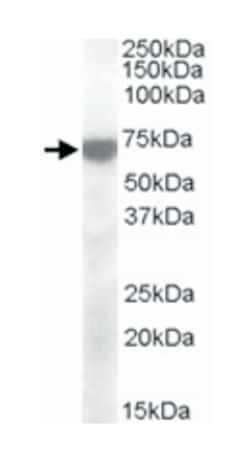Learn More
KCNQ4, Goat, Polyclonal Antibody, Abnova™
Goat polyclonal antibody raised against synthetic peptide of KCNQ4.
Supplier: Abnova Corporation PAB11544
Description
The protein encoded by this gene forms a potassium channel that is thought to play a critical role in the regulation of neuronal excitability, particularly in sensory cells of the cochlea. The current generated by this channel is inhibited by M1 muscarinic acetylcholine receptors and activated by retigabine, a novel anti-convulsant drug. The encoded protein can form a homomultimeric potassium channel or possibly a heteromultimeric channel in association with the protein encoded by the KCNQ3 gene. Defects in this gene are a cause of nonsyndromic sensorineural deafness type 2 (DFNA2), an autosomal dominant form of progressive hearing loss. Two transcript variants encoding different isoforms have been found for this gene. [provided by RefSeq
Sequence: C-DKGPSDAEVVDESpecifications
| KCNQ4 | |
| Polyclonal | |
| Unconjugated | |
| ELISA (1:4000) Western Blot (1-3 ug/mL) The optimal working dilution should be determined by the end user. | |
| KCNQ4 | |
| KCNQ4 | |
| A synthetic peptide corresponding to human KCNQ4. | |
| 100 μg | |
| Primary | |
| Human | |
| Liquid |
| ELISA, Western Blot | |
| 0.5 mg/mL | |
| Goat polyclonal antibody raised against synthetic peptide of KCNQ4. | |
| In Tris saline, pH 7.3 (0.5% BSA, 0.02% sodium azide) | |
| DFNA2/KV7.4 | |
| Goat | |
| Antigen affinity purification | |
| RUO | |
| 9132 | |
| Store at -20°C. Aliquot to avoid repeated freezing and thawing. |
Your input is important to us. Please complete this form to provide feedback related to the content on this product.
For Research Use Only
